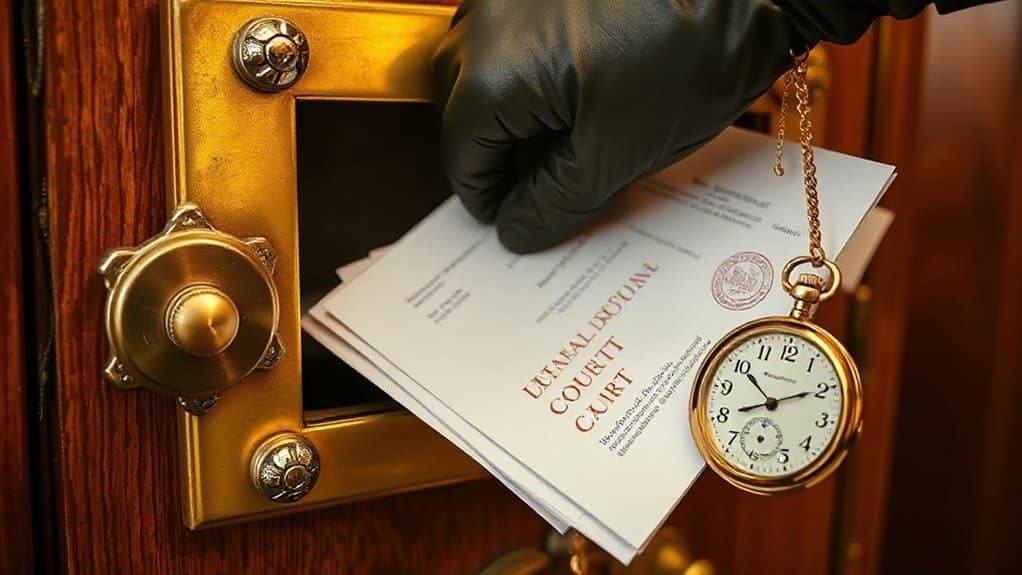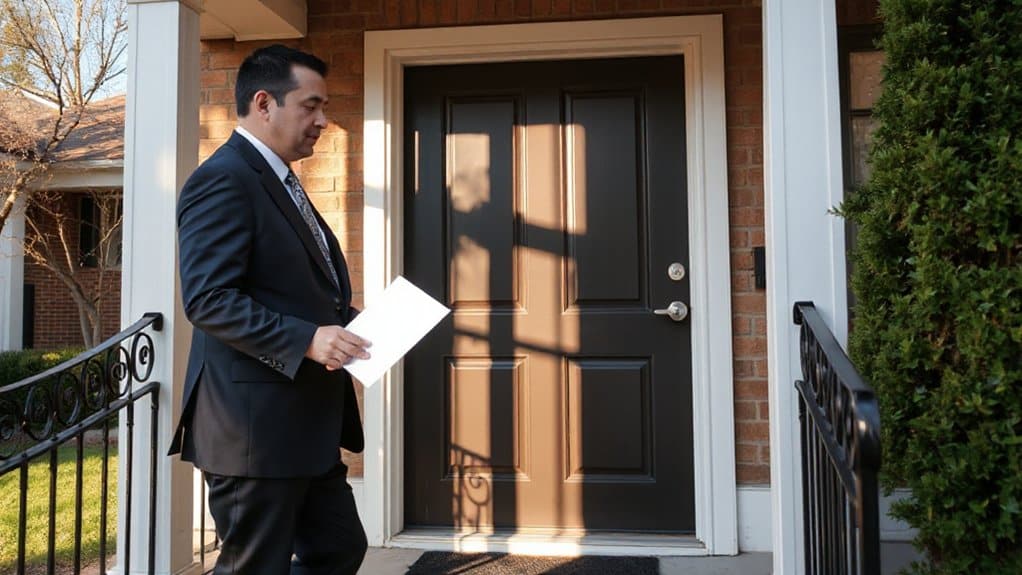Service of process guarantees defendants receive proper legal notice through strict adherence to jurisdictional requirements and statutory procedures. Valid service methods include personal delivery, substituted service through authorized representatives, certified mail with return receipts, and court-approved electronic delivery. Federal and state rules establish specific deadlines, typically 90-120 days post-filing, with detailed documentation requirements including sworn affidavits and proof of service forms. Failure to comply renders court proceedings void, making procedural accuracy essential for protecting due process rights and maintaining case validity throughout litigation.
Key Takeaways
- Personal service requiring direct hand-to-hand transfer to defendants remains the gold standard for ensuring legal documents reach intended recipients.
- Strict compliance with jurisdictional requirements and statutory procedures is essential, as failure renders subsequent court proceedings void.
- Alternative service methods include substituted service, certified mail with return receipts, and court-authorized publication for unknown defendant locations.
- Proper documentation through sworn affidavits, proof of service forms, and delivery evidence protects due process rights and establishes jurisdiction.
- Electronic service methods with real-time confirmation and digital authentication are increasingly accepted alongside traditional delivery approaches.
What Constitutes Valid Service of Process

Validity in service of process hinges on strict compliance with jurisdictional requirements that guarantee defendants receive actual notice of pending legal proceedings and a meaningful opportunity to respond. Valid service demands adherence to specific statutory procedures that vary by jurisdiction and case type. Service requirements typically mandate proper identification of parties, accurate delivery methods, and documented proof of completion. Courts recognize several acceptable methods including personal service, substituted service through authorized individuals, and certified mail when permitted by law. Process servers must follow prescribed timelines and geographic limitations while maintaining detailed records of their attempts. Understanding service requirements is essential as failure to satisfy these service requirements renders subsequent court proceedings void, regardless of case merits, emphasizing the critical importance of procedural compliance in litigation.
Federal Rules vs. State Requirements for Document Delivery
While federal and state courts maintain distinct procedural frameworks for document delivery, practitioners must navigate the fundamental differences between Federal Rules of Civil Procedure and individual state requirements to confirm proper service. Federal Rule 4 establishes standardized protocols across all federal jurisdictions, permitting service through personal delivery, authorized agents, or certified mail in specific circumstances. However, state nuances create significant variations in acceptable methods, timing requirements, and documentation standards. Some states mandate sheriff service for certain cases, while others accept private process servers or electronic delivery. Federal variations typically offer broader flexibility in service methods, whereas state systems often impose stricter procedural constraints. Legal professionals must thoroughly research applicable jurisdictional requirements to confirm compliance and avoid dismissals based on defective service procedures, making the expertise of private investigators especially valuable in ensuring proper document delivery.
Methods of Serving Legal Papers on Defendants
Building upon the jurisdictional framework requirements, courts recognize several distinct methods for delivering legal documents to defendants, each carrying specific procedural safeguards and validation requirements. Legal practitioners must navigate these established protocols to guarantee proper notice and constitutional due process protection.
Personal service methods represent the gold standard for document delivery, requiring direct hand-to-hand transfer to the named defendant. This approach provides the highest level of certainty regarding actual receipt and minimizes potential constitutional challenges.
Alternative delivery methods expand serving options when personal contact proves impractical:
- Substituted service through authorized household members or business representatives
- Certified mail delivery with return receipt documentation
- Publication notice for defendants whose whereabouts remain unknown after diligent search efforts
Stillinger Investigations emphasizes the importance of proper service, as each method requires strict compliance with jurisdictional rules to maintain legal validity.
Time Limits and Deadlines for Completing Service

Once proper service methods are selected, practitioners must adhere to strict temporal requirements that govern when service must be completed to preserve legal claims and maintain court jurisdiction. Service deadlines vary considerably across jurisdictions, typically ranging from 90 to 120 days after filing the initial complaint. Federal courts generally allow 90 days under Rule 4(m), while state courts may extend this period. Missing these process timing requirements can result in case dismissal, requiring refiling and potential statute of limitations complications. Legal professionals within the litigation community understand that calendar management becomes critical during this phase. Some jurisdictions permit extensions upon showing good cause, but courts increasingly scrutinize delay justifications. Establishing systematic tracking procedures guarantees compliance with these non-negotiable temporal boundaries that protect both plaintiff rights and judicial efficiency. Additionally, reliable process service ensures formal notification of defendants, reinforcing the importance of timely adherence to deadlines.
Serving Corporations, LLCs, and Business Entities
Corporate entities present unique procedural challenges that require specialized knowledge of applicable statutes and business structures when effecting proper service of process. Unlike individuals, business entities cannot personally receive documents, necessitating service upon designated representatives who possess legal authority to accept papers on behalf of the organization.
Practitioners must navigate three critical requirements:
- Identify the proper corporate representative – typically registered agents, officers, or managing members
- Verify the current business address through state filing records and corporate databases
- Confirm entity status to ascertain the business remains active and in good standing
Successfully serving corporations, LLCs, and partnerships requires understanding each jurisdiction’s specific statutes governing business entity service. Proper identification of authorized recipients and current addresses protects against dismissal while guaranteeing defendants receive adequate notice of pending litigation. Additionally, ensuring that the service is executed by a licensed investigator enhances the credibility and reliability of the process.
International Service and Cross-Border Legal Documents
When litigation involves defendants located in foreign countries or requires service of U.S. legal documents abroad, practitioners must comply with international treaties, foreign sovereign laws, and federal procedural requirements that govern cross-border service of process. The Hague Service Convention provides the primary framework for transmitting judicial documents between member nations, establishing standardized procedures that respect each country’s sovereignty while ensuring effective delivery. Attorneys must navigate designated Central Authorities in receiving countries, which serve as official conduits for processing service requests. Alternative methods include diplomatic channels through consular offices, though these routes often involve lengthy processing times. Some jurisdictions permit direct service through authorized agents or certified mail, but practitioners must verify acceptance under both domestic and foreign law before proceeding with litigation. Understanding legal protections and requirements for service of process is essential for ensuring compliance and avoiding delays.
Substituted Service When Personal Delivery Fails

If personal service proves impossible despite diligent efforts, courts authorize substituted service methods that provide defendants with reasonable notice while protecting their due process rights. Legal practitioners must understand these alternative service options to guarantee effective case progression when traditional delivery fails.
Courts typically recognize three primary substituted service methods:
- Service by publication – Publishing notice in newspapers of general circulation when defendants cannot be located
- Service on authorized agents – Delivering documents to designated representatives or registered agents
- Service by posting – Affixing documents to property or court bulletin boards as directed by judicial order
Each jurisdiction maintains specific requirements for implementing these service methods. Courts evaluate factors including defendant location attempts, urgency of proceedings, and constitutional notice standards before approving alternative service requests. Additionally, understanding the intricacies of private investigation services can significantly enhance the effectiveness and efficiency of locating defendants for service.
Electronic Service and Digital Document Delivery
Modern legal practice increasingly relies on electronic service methods that complement traditional and substituted service approaches. Courts now authorize email delivery, secure electronic portals, and certified digital platforms to guarantee efficient document transmission. Electronic notifications provide real-time confirmation when recipients access served documents, creating reliable delivery records that satisfy jurisdictional requirements.
Legal professionals must verify that electronic service complies with specific court rules and statutory provisions. Many jurisdictions mandate recipient consent before implementing digital delivery methods. Digital signatures authenticate both sender identity and document integrity, establishing legally binding proof of service completion. Expert investigative services can assist legal professionals in ensuring the effectiveness of electronic service methods.
Electronic service platforms typically generate automatic timestamps and delivery receipts, creating thorough audit trails. These systems enable attorneys to track document accessibility while maintaining professional standards that courts recognize as equivalent to traditional service methods.
Proof of Service and Required Documentation
Courts require attorneys to establish definitive proof that proper service occurred through thorough documentation that validates each step of the delivery process. Legal professionals must understand that inadequate documentation can jeopardize entire cases, making meticulous record-keeping essential for protecting client interests.
Essential documentation components include:
- Completed proof of service forms that detail the exact method, date, time, and location of delivery
- Sworn affidavits from process servers containing specific descriptions of the recipient and delivery circumstances
- Supporting evidence such as certified mail receipts, digital delivery confirmations, or photographic documentation
Affidavit requirements vary by jurisdiction, but typically mandate detailed descriptions of service attempts, recipient identification, and process server credentials. Courts scrutinize these documents carefully, as they form the foundation for establishing proper jurisdiction and ensuring due process rights remain protected throughout litigation. Additionally, employing experienced process servers can significantly improve the chances of successful service and reduce risk of challenges to the validity of the service.
Common Mistakes That Invalidate Service Attempts
Service attempts frequently fail due to procedural errors that attorneys overlook during the rush to meet filing deadlines. Common errors include serving outdated addresses, failing to verify recipient identity, and using improper delivery methods. Legal professionals must recognize that service pitfalls often stem from inadequate research or misunderstanding jurisdiction-specific requirements.
Timing violations represent another critical failure point, particularly when statutory deadlines expire before proper service completion. Insufficient documentation compounds these problems, as courts require detailed proof demonstrating compliance with procedural rules. Process servers sometimes lack proper authorization or fail to follow prescribed protocols for their jurisdiction. Understanding legal boundaries is crucial for ensuring effective service of process and avoiding pitfalls that can undermine the validity of the attempts.
Understanding these frequent mistakes enables legal teams to implement preventive measures, ensuring service attempts meet all procedural requirements and withstand potential challenges from opposing counsel.
Frequently Asked Questions
How Much Does It Typically Cost to Hire a Professional Process Server?
Professional process server fees demonstrate significant regional differences across jurisdictions, with average costs ranging from $45 to $200 per service attempt. Urban markets typically command higher rates due to increased operational expenses, while rural areas often offer more competitive pricing. Standard document delivery generally costs $50-$100, though complex cases requiring multiple attempts or specialized expertise may exceed these baseline figures. Legal professionals consistently recognize these investments as essential for ensuring proper procedural compliance and successful case outcomes.
Can I Serve Legal Documents Myself or Must I Use a Third Party?
Self Service Regulations vary markedly by jurisdiction and document type, creating important Process Service Considerations for legal practitioners. While many courts permit self-service in certain circumstances, specific restrictions often apply regarding who may serve particular documents and how service must be executed. Professional legal communities typically recommend consulting local court rules and statutory requirements before attempting self-service, as improper service can invalidate proceedings and delay case resolution considerably.
What Happens if the Defendant Refuses to Accept the Legal Documents?
When defendants refuse to accept legal documents, process servers employ alternative delivery methods to guarantee proper service. These methods include substituted service through family members, posting documents at the residence, or publication in newspapers when authorized by courts. Defendants cannot avoid legal proceedings through refusal tactics. Legal consequences of refusal remain unchanged, as courts proceed with cases once proper service is established through approved alternative means.
Are There Any Legal Documents That Cannot Be Served Electronically Under Any Circumstances?
Certain exempt documents remain subject to electronic limitations despite advancing digital service methods. Original wills, adoption papers, and specific criminal warrants typically require physical delivery to preserve their legal integrity. Courts generally mandate traditional service for documents involving constitutional rights, such as restraining orders and eviction notices. These restrictions guarantee due process protection and maintain the solemnity required for proceedings affecting fundamental rights and liberties.
Can Service of Process Be Completed on Weekends, Holidays, or After Business Hours?
Weekend service and holiday delivery of legal documents are generally permissible in most jurisdictions, though specific restrictions may apply. Courts typically allow process servers to effectuate service during non-business hours, including evenings and weekends, as defendants remain legally accessible outside traditional business schedules. However, practitioners should consult local rules, as certain jurisdictions impose limitations on Sunday service or require special court authorization for holiday delivery of particularly sensitive documents.
Conclusion
Proper service of process forms the foundation of due process rights and court jurisdiction. Legal practitioners must carefully navigate federal and state requirements, select appropriate service methods, and maintain meticulous documentation to guarantee validity. Failure to comply with procedural rules can result in dismissed cases and wasted resources. As digital technologies evolve, courts continue adapting service methods while preserving fundamental constitutional protections. Mastering these requirements remains essential for effective legal practice.






